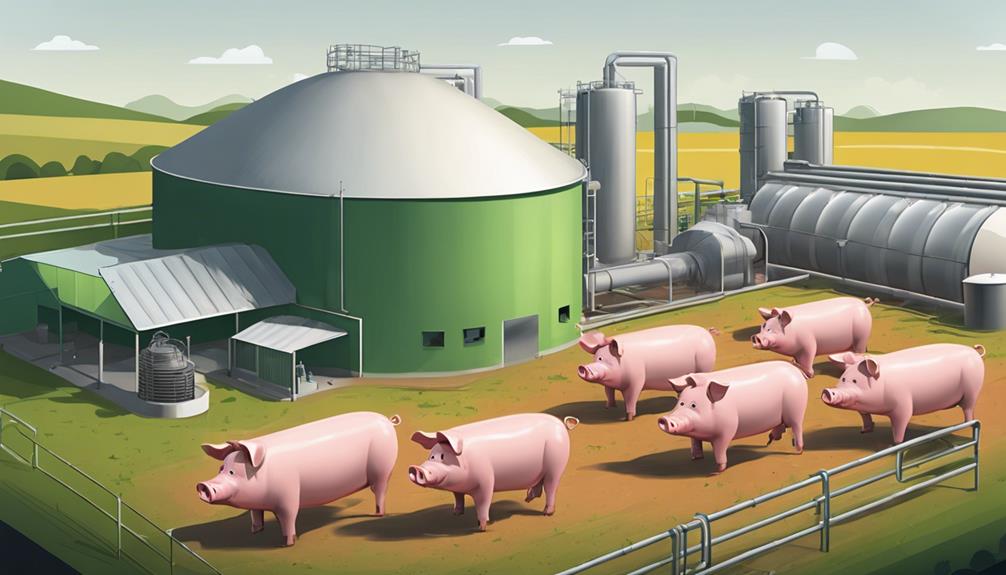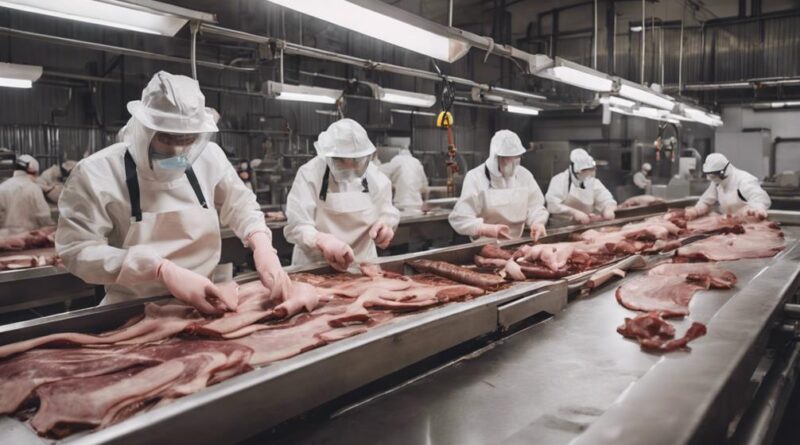Exploring Industrial Applications of Pig Products
Ever thought pigs were just for bacon and ham? Think again. From leather production to pharmaceutical uses, the versatile applications of pig products might surprise you.
Imagine the myriad ways these animals contribute to various industries, sparking innovation and efficiency. Let's explore the fascinating world of industrial uses for pig-derived materials, where creativity meets sustainability, and traditional perceptions are challenged.
The realm of possibilities is vast, and the benefits extend far beyond the farmyard.
Leather Production
If you've ever worn a leather jacket or carried a leather bag, you've likely interacted with a product of the industrial process known as leather production. Leather, a material synonymous with durability and style, undergoes a series of intricate steps before reaching its final form. The tanning process, a crucial stage in leather production, involves treating raw animal hides to make them resistant to decomposition. When considering sustainable sourcing, it's essential to ensure that the leather comes from responsibly managed farms or suppliers to minimize environmental impact.
In recent years, there's been a growing interest in leather alternatives due to concerns about the environmental implications of traditional leather production. Innovations in the industry have led to the development of materials such as vegan leather, which mimic the look and feel of genuine leather without the need for animal products. These alternatives offer a more sustainable choice for consumers looking to reduce their carbon footprint and support ethical practices.
Despite the availability of leather alternatives, genuine leather remains a popular choice in fashion and design. Understanding the tanning process and promoting sustainable sourcing practices can help mitigate the environmental impact associated with leather production. By making informed decisions about the products we choose, we can contribute to a more sustainable future for both the industry and the planet.
Gelatin Manufacturing
Exploring the intricate process of manufacturing gelatin unveils the fascinating transformation of animal collagen into a versatile ingredient with numerous industrial applications. Gelatin, derived from the hydrolysis of collagen, finds its way into various sectors due to its unique properties. In the food industry, gelatin serves as a thickening agent in products like marshmallows and gummy candies. Moreover, its ability to form strong, transparent films makes it valuable for edible coatings on medicines, vitamins, and even fresh produce.
Beyond the culinary realm, gelatin plays a crucial role in the pharmaceutical and medical fields. Within pharmaceuticals, gelatin is utilized as a binding agent in the production of capsules for medicines and supplements. Its compatibility with the human body makes it a popular choice for encapsulating drugs, vitamins, and other pharmaceutical products. Furthermore, gelatin is instrumental in the development of medical implants due to its biodegradable nature and biocompatibility. It's commonly utilized in the production of wound dressings, hemostatic sponges, and even as a component in bone grafts.
Pharmaceutical Uses
Moving from the realm of gelatin manufacturing, the pharmaceutical industry heavily relies on this versatile ingredient for various crucial applications. Here's a closer look at how pig products are utilized in pharmaceutical uses:
- Drug Delivery: One of the key areas where pig-derived products, especially gelatin, play a vital role in the pharmaceutical industry is drug delivery systems. Gelatin is used to create capsules for oral medications, where it acts as a safe and effective means to encapsulate drugs and facilitate their delivery into the body. The biocompatibility and ease of digestion of gelatin capsules make them a popular choice for pharmaceutical companies worldwide.
- Antibiotic Development: Another significant application of pig products in pharmaceuticals is in antibiotic development. Gelatin is utilized in the production of antibiotic coatings for various types of medications. These coatings can help control the release of antibiotics, ensuring optimal dosage and effectiveness. Additionally, gelatin-based materials are often used in wound dressings and other medical devices designed to deliver antibiotics directly to the site of infection.
Industrial Lubricants
Pig-derived lubricants are widely utilized in various industrial applications due to their excellent performance and versatility. These lubricants play a crucial role in metal coatings and corrosion prevention. By forming a protective layer on metal surfaces, pig-derived lubricants help shield against moisture and corrosive elements, extending the lifespan of equipment and machinery.
In terms of machinery maintenance, pig-derived lubricants excel at friction reduction, ensuring smooth operation and reducing wear and tear on moving parts. Their high viscosity and thermal stability make them ideal for heavy-duty applications where heat and pressure are constant factors. Whether used in automotive, manufacturing, or other industrial settings, pig-derived lubricants offer superior lubrication properties that contribute to the efficiency and longevity of machinery.
Furthermore, pig-derived lubricants are preferred for their environmentally friendly nature, making them a sustainable choice for industries looking to reduce their carbon footprint. The biodegradability of these lubricants aligns with modern eco-conscious practices, appealing to companies striving for greener solutions in their operations.
Collagen in Cosmetics
Collagen plays a significant role in the formulation and efficacy of cosmetics, enhancing skin elasticity and promoting a youthful appearance. Incorporating collagen into skincare products offers a range of benefits that align with current skincare trends. Here's why collagen is a must-have ingredient in your beauty routine:
- Collagen Benefits:
- Collagen is a natural protein found in the skin that provides structure and elasticity. By including collagen in cosmetics, you can boost your skin's firmness and reduce the appearance of wrinkles and fine lines.
- This protein also helps to improve skin hydration and overall texture, giving you a smoother and more radiant complexion.
- With collagen-infused products, you can support your skin's natural regeneration process, leading to a more youthful and revitalized look.
In today's skincare trends, collagen has become a popular ingredient due to its ability to address various skin concerns effectively. Whether you're looking to prevent premature aging or restore your skin's elasticity, collagen-based cosmetics offer a holistic approach to skincare. By incorporating collagen into your beauty regimen, you can enjoy the multiple benefits it provides, keeping your skin looking healthy and vibrant.
Pig Hair Brushes
Using pig hair in brushes is a traditional practice that has been valued for its unique properties in various applications. When it comes to sustainable grooming tools, pig hair brushes stand out for their durability and eco-friendly nature. The bristles of these brushes are known for their resilience, making them ideal for long-term use in hair care and grooming routines.
In addition to being sustainable, pig hair brushes also offer artistic brush options for painters and artists. The fine and flexible nature of pig hair bristles makes them perfect for creating smooth and precise brushstrokes, enhancing the quality of artistic work. Artists appreciate these brushes for their ability to hold and distribute paint evenly, resulting in beautiful and detailed artwork.
Whether you're a professional artist looking for high-quality brushes or someone seeking sustainable grooming tools, pig hair brushes offer a versatile and effective solution. By incorporating pig hair into brush manufacturing, you not only benefit from its unique properties but also contribute to sustainable practices in the industry. Consider adding pig hair brushes to your collection for both practical grooming needs and artistic endeavors.
Biogas Generation

To harness renewable energy from organic waste, consider exploring the process of biogas generation. Biogas generation involves anaerobic digestion, a sustainable solution that not only helps in waste management but also produces renewable energy.
Here are three key points to help you understand the importance of biogas generation:
- Renewable Energy Source: Through anaerobic digestion, organic waste such as pig manure can be broken down by microorganisms to produce biogas. This biogas, mainly methane, can be used as a renewable energy source for heating, electricity generation, or even as a vehicle fuel. By tapping into biogas generation, you can contribute to reducing reliance on fossil fuels and lowering greenhouse gas emissions.
- Waste Management: Biogas generation provides a sustainable solution for managing organic waste, such as pig manure, that would otherwise release harmful greenhouse gases into the atmosphere. By utilizing anaerobic digestion, not only are you producing valuable biogas, but you're also effectively treating the waste, reducing odors, and minimizing environmental pollution.
- Economic Benefits: Implementing biogas generation systems can lead to economic benefits such as cost savings on energy bills, potential revenue from selling excess electricity or biogas, and even creating new job opportunities in the renewable energy sector. By investing in biogas generation, you not only contribute to a cleaner environment but also open up avenues for financial gains.
Pig By-product Fertilizers
Considering the sustainable utilization of pig by-products, a valuable avenue to explore is the production and application of pig by-product fertilizers in agriculture. Pig by-product fertilizers are derived from organic materials such as manure, urine, and leftover feed from pigs, making them a sustainable and eco-friendly option for organic farming practices.
These fertilizers provide numerous agricultural benefits. Firstly, they're rich in essential nutrients like nitrogen, phosphorus, and potassium, which are vital for plant growth and soil health. By using pig by-product fertilizers, farmers can enhance soil fertility, improve crop yield, and promote overall plant health without relying heavily on synthetic fertilizers.
Moreover, pig by-product fertilizers can help reduce the environmental impact of agriculture. They aid in soil structure improvement, water retention, and erosion prevention, contributing to sustainable farming practices. Additionally, by recycling pig by-products into fertilizers, farmers can effectively manage waste and reduce greenhouse gas emissions from traditional waste disposal methods.
Frequently Asked Questions
How Are Pig Products Used in the Production of Renewable Energy Sources?
When it comes to renewable energy sources, pig products play a vital role in biofuel production. Pig waste can be converted into biogas through anaerobic digestion, offering a sustainable way to manage waste and generate energy.
This process not only contributes to energy sustainability but also maximizes resource utilization by turning a potential waste stream into a valuable energy source.
Are There Any Safety Concerns or Regulations Surrounding the Use of Pig By-Products in Industrial Applications?
When using pig by-products in industrial applications, safety regulations are crucial to address potential hazards. Environmental concerns also play a significant role in ensuring responsible usage.
It's essential to comply with safety standards and regulations to safeguard workers and the environment. By following proper guidelines, you can mitigate risks and contribute to sustainable practices in utilizing pig products for industrial purposes.
What Innovative Technologies Are Being Developed to Optimize the Use of Pig Products in Industrial Settings?
When you look at innovative technologies for using pig products in industry, you'll find solutions that focus on sustainable practices and waste reduction. Efficiency and product innovation are key factors driving these advancements.
How Do Pig Products Compare to Other Animal-Derived Materials in Terms of Cost and Effectiveness for Industrial Applications?
When looking at pig products for industrial use, it's important to consider cost comparison and effectiveness analysis. Pig products can be cost-effective and highly effective in various applications compared to other animal-derived materials.
Are There Any Emerging Trends or Future Developments in the Industrial Use of Pig Products That We Should Be Aware Of?
As you look into the industrial use of pig products, keep an eye on market trends and sustainability practices. Emerging developments may impact the global market significantly.
Stay informed about the latest advancements in pig product applications to understand their potential impact on various industries. Stay ahead of the game by monitoring future developments and their implications for sustainable practices and market demands.
Conclusion
In conclusion, exploring the industrial applications of pig products offers a wide range of possibilities for various industries. From leather production to pharmaceutical uses, pig by-products have proven to be versatile and valuable resources.
By utilizing these products in innovative ways, companies can not only reduce waste but also create sustainable solutions that benefit both the environment and the economy.
The potential for pig products in industrial applications is truly promising.
